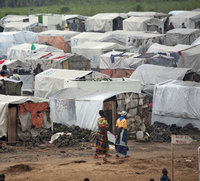The World Bank's 2011 World Development Report is out, and this year's version highlights the interplay between "conflict, security, and development." That's a welcome theme to someone who's spent the last decade describing how globalization's spreading connectivity and rules have rendered certain regions stable, while their absence has condemned others to perpetual strife. But although the growing international awareness of these crosscutting issues is long overdue, the report ultimately disappoints by focusing only on the available tools with which great powers might collaborate on these stubborn problems, while ignoring the motivations that prevent them from doing so.
First, the good news: Civil wars have decreased dramatically in frequency from the temporary spurt unleashed by the collapse of the Soviet empire at the end of the 1980s. That means we are back in the 1970s range of three-dozen or so situations of chronic civil conflict, out of a global roster of almost 200 states, with 90 percent of the affected states having suffered similar strife in their recent past.
This is an important development. During the great wave of colonial independence movements in the 1960s, most civil wars occurred in countries that hadn't experienced conflict recently. The current situation reflects the fact that globalization has effectively spread to about three-quarters of the world, with only "bad neighborhoods" -- albeit comprising about a billion-and-a-half inhabitants -- still on the outside.

